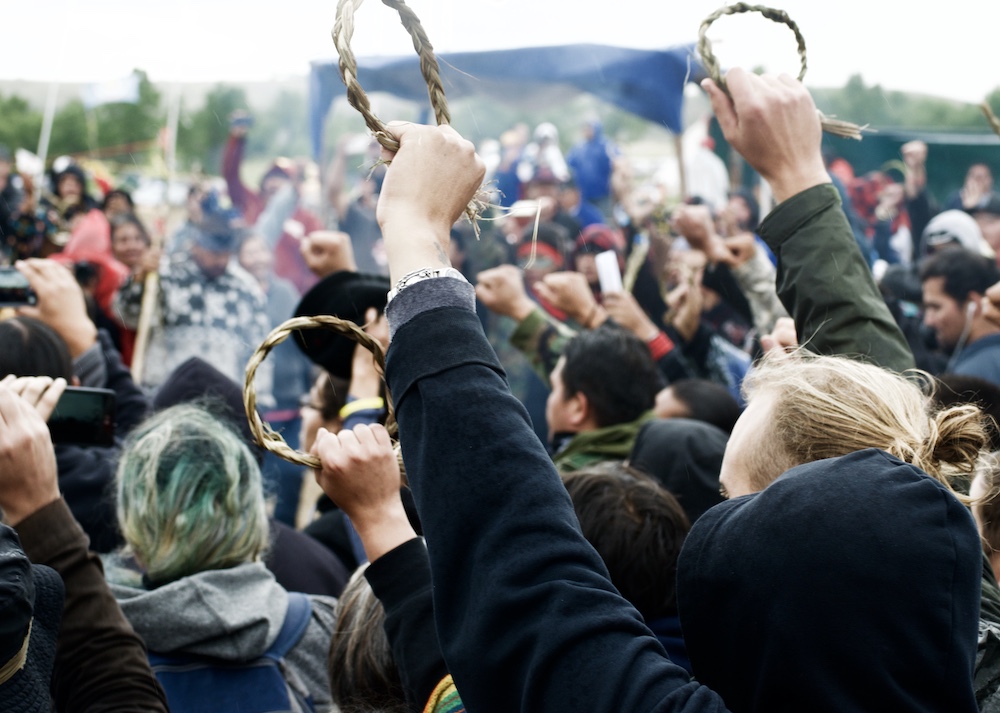
- Details
- By Wakinyan LaPointe and Thorne LaPointe
Guest Opinion. Indigenous Peoples’ Day is a call to higher consciousness, and it is one that is not solely defined by human beings, but emerges from the original instructions of what the Lakota people also call wotakuye (relations with all life).
Lakota children are taught that the earth is their grandmother, and that they are participants in her story. She gives us life, shelter, food, warmth, joy, and many other gifts. In contrast, the settler-colonial was taught that Unci Maka (Grandmother Earth) was property and meant for exploitation and one’s capitalist ambitions. However, it is time for the settler colonial to divest from this concept, to listen to Indigenous voices, and invest in Unci Maka as a relative that deserves inherent respect, honor, and reverence.
Indigenous movements carry the generational dreams and fire of their predecessors and ancestors needed to ignite, and spark transformation across the world. Indigenous narratives and storytellers are perhaps among our best hopes in breaking through settler-colonial narratives aimed at widespread capitalist environmental degradation that threaten all life.
Indigenous Peoples and youth give hope for a better tomorrow as they spearhead decolonization, indigenization, and decolonial methodologies that liberate Indigenous earth and water ethics. As they fight for treaty rights, human rights, rights of nature, dismantling and moving colonial systems out of the way. They remind us of what it means to be human, and that we are not the master narrative — Unci Maka is, and we are simply participating in her narrative.
The purpose of this article is to point to the heart of what is needed at this time. It is the wisdom, innovation, and courage of Indigenous Peoples and youth to shape and transform local and global realities using our languages, imaginations, and values. It is the self-care, rest, and wellbeing needed to nourish brilliant ideas and movements. It is Indigenous Peoples, and youth, together, to counter and transcend settler-colonial narratives.
Every time an Indigenous person enters place and space, their truth and voice have the power to rupture colonial norms built on injustice, they indigenize spaces that were occupied by settler-colonial imaginations. Indigenous voices have the power to resituate Indigenous worldviews, liberation, justice, and freedom in a single moment across global and local consciousnesses.
In settler-colonial spaces, Indigenous voices are innovative. Because they rupture and break through the conventional binaries of the settler colonial imagination in spaces that were anti-Indigenous. And because Indigenous voices are needed now more than ever.
Indigenous Peoples’ Day is a call to action, to reflect on how one can meaningfully participate in the Indigenous world story. How one contributes socially, economically, and politically to disrupt, dismantle the unsustainable and misaligned narratological trajectories set forth by settler-colonialism.
Indigenous Peoples’ Day is today, and it is every day. It is a reminder to the settler-colonial that our stories are not over, and it is time to listen.
On this day, we remember and honor the timeless generational gifts and voices of our ancestors, predecessors, elders, Indigenous Peoples, and youth, and those who have gone onto the spirit world. We remember the children who never made it back from boarding schools, and the survivors who did. We remember the global Indigenous movements and their struggles for the land and water. We remember all those who continue to resist and overcome settler-colonial forces, and those who continue to carry on our ways of life.
Wopila Tanka (Our Sincerest & Immeasurable Thanks).
Wakinyan LaPointe, Ph.D. Student, M.N.M. Wakinyan is a Sicangu Lakota citizen of the Rosebud Sioux Tribe. He is a Mni Ki Wakan Co-Convener, human rights advocate, Lakota singer, and storyteller. Thorne LaPointe, Sicangu Lakota citizen of the Rosebud Sioux Tribe. He is a Mni Ki Wakan Co-Convener, human rights advocate, Lakota singer, and storyteller.
Help us defend tribal sovereignty.
At Native News Online, our mission is rooted in telling the stories that strengthen sovereignty and uplift Indigenous voices — not just at year’s end, but every single day.
Because of your generosity last year, we were able to keep our reporters on the ground in tribal communities, at national gatherings and in the halls of Congress — covering the issues that matter most to Indian Country: sovereignty, culture, education, health and economic opportunity.
That support sustained us through a tough year in 2025. Now, as we look to the year ahead, we need your help right now to ensure warrior journalism remains strong — reporting that defends tribal sovereignty, amplifies Native truth, and holds power accountable.
 The stakes couldn't be higher. Your support keeps Native voices heard, Native stories told and Native sovereignty defended.
The stakes couldn't be higher. Your support keeps Native voices heard, Native stories told and Native sovereignty defended.
Stand with Warrior Journalism today.
Levi Rickert (Potawatomi), Editor & Publisher

